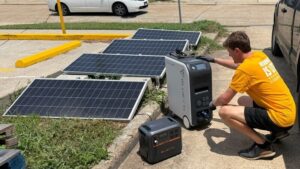Reading Time: 3 minutes
Todd and Julie Chrisley received a full pardon from Donald Trump.
What now?
According to Savannah, her parents will be out of prison almost immediately.
Todd and Julie will have to readjust to life. There is also a financial angle to this act of executive clemency.


The wait is over for Todd and Julie Chrisley
Late on Tuesday, May 27, Savannah Chrisley took to her Instagram page to gush about happy news for her family.
“TODD AND JULIE CHRISLEY PARDONED,” she captioned the video.
She shared that Trump had called her as she was going into Sam’s Club to inform her that her parents, who have been serving notably lengthy sentences on tax and bank fraud convictions, will soon be released.
“We are freaking out over here, I have shed so many tears,” Savannah shared.
“Both my parents are coming home tonight or tomorrow,” she specified.
“And I still don’t believe it’s real.”
She admitted that the family was in a rush to prepare for this unexpected homecoming.


What about the $17 million in restitution?
TMZ points out that this pardon goes further than merely ending Todd and Julie Chrisley’s lengthy prison sentences.
Part of their sentence required paying back a whopping $17 million in restitution for their financial crimes.
The Chrisleys had apparently paid back some, but far from all, of the total sum.
Now, under federal law, the pardon means that they no longer have to repay their victims.


In fact, depending upon Trump’s whims at the time, his pardon may have included a requirement for Todd and Julie Chrisley’s victims to repay them any restitution that they’ve already received.
We know that Savannah campaigned for Trump last year.
Where in some cases, his recent string of pardons have an obvious quid-pro-quo (one criminal’s mom attended his $1 million dinner, for example), it’s unclear if Savannah personally spoke with Trump about what she wanted for her parents.
One would hope that the pardon is limited to ending their sentences early.
But hope means little in the endless screaming horror that is 2025.


Is this pardon a good thing?
For years, we have discussed the extremes of Todd and Julie Chrisley’s prison sentences.
Twelve and seven years, respectively, is an enormous amount of time for non-violent offenders.
(Violence takes many forms, and someone sitting behind a desks could cause more harm and death than a maniac with a gun — but we’re talking about, like, fudging paperwork with the bank and when applying to rent)
On the one hand, no matter what we think of Todd and Julie as people (nothing good), they’ve realistically served plenty of time behind bars.
Incarceration does not make people into better human beings. And the Chrisleys are likely a lost cause in that regard.


At the same time, a full pardon seems like a deliberate defiance of justice. (The Chrisleys have claimed that their prosecution, which began under Trump’s first term, was politically motivated)
Perhaps a more appropriate action would have been to commute their sentences.
This power of executive clemency allows a president to reduce a sentence without impacting the conviction itself.
That seems like it would have been in the interests of justice. Which, of course, does not matter at all to Trump.









